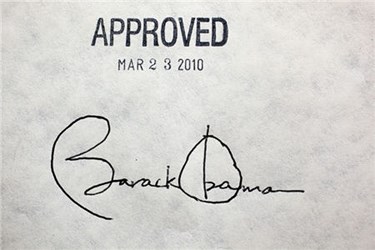What A Trump Presidency Means For Obamacare

By Christine Kern, contributing writer

Trump promised that he would repeal Obamacare, but will lawmakers really do it?
There has been a great deal of speculation regarding the future of Obamacare since the results of November’s presidential election came in. Donald Trump campaigned with a promise of undoing most of the provisions of the Affordable Care Act (ACA), and many Republicans have long been trying to repeal the legislation and replace it with alternatives.
As Health IT Outcomes reported, Trump called the ACA both an “economic burden” and a “horror” on the campaign trail, saying he wants to lead the effort to bring “much needed” free market reforms to the healthcare industry. He even pledged to make the repeal of Obamacare one of his very first acts as President, stating, “No person should be required to buy insurance unless he or she wants to.”
Trump’s selection of Dr. Tom Price as the new head of the Department of Health and Human Services (HHS) seems to support that move. Price is a leading critic of Obamacare, and Trump called him “exceptionally qualified” to lead the move to “repeal and replace ‘Obamacare and bring affordable and accessible healthcare to every American.’”
Now, Senate Majority Leader Mitch McConnell has renewed his pledge to repeal the ACA when Congress returns to business on Jan. 3, despite the fact Republicans have no replacement bill in place. McConnell stressed repeatedly the ACA is not sustainable and it was irresponsible to wait for it to implode. McConnell said, “If coverage was the issue, Obamacare was an abysmal failure. Surely, we can do better for the American people.”
House Speaker Paul Ryan has also pledge to move quickly on a repeal bill and to work to replace the ACA. “We will move right after the first of the year on an Obamacare replacement resolution, and then we’ll work expeditiously to come up with a better proposal than current law, because current law is simply unacceptable and not sustainable,” McConnell said.
President-elect Trump has dialed back on his rhetoric slightly since his election, however, telling The Wall Street Journal, “Either Obamacare will be amended, or repealed and replaced,” adding he told Obama he “will look at his suggestions, and out of respect, I will do that.”
Trump does support two of the most popular provisions under Obamacare: the rule allowing young adults to remain on their parents’ health care plans until they are 26 and the prohibition barring insurers from discriminating against patients with pre-existing conditions.
Price does have a plan to repeal and replace Obamacare which hinges on a complex federal tax-credit and subsidy system, according to Time. Under this plan, the federal government would provide age-adjusted tax credits to subsidize health insurance premiums for Americans on a deregulated open market. The plan would also allow the sale of insurance plans across state lines, subsidize states for offering insurance to “high risk” populations, and expand access to private health savings accounts. It also would eliminate the Medicaid expansion as mandated under Obamacare.
Without a 60-vote supermajority in the Senate, Republicans can’t repeal the entire Affordable Care Act. But they can eliminate several consequential provisions through a special budgetary process called reconciliation, so that will likely be the route taken by Republicans in January.
